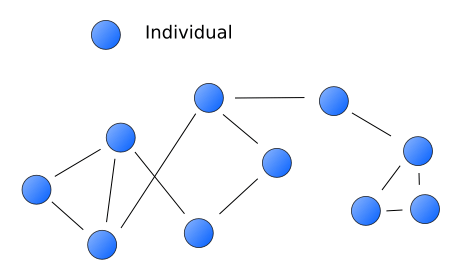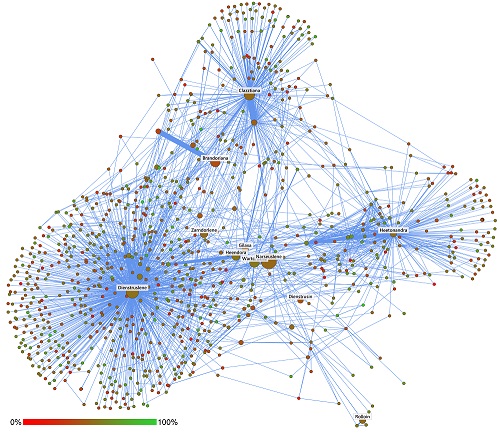Trending
Opinion: How will Project 2025 impact game developers?
The Heritage Foundation's manifesto for the possible next administration could do great harm to many, including large portions of the game development community.

Featured Blog | This community-written post highlights the best of what the game industry has to offer. Read more like it on the Game Developer Blogs or learn how to Submit Your Own Blog Post
Social connections are important to the experience of many online games. In Destiny´s PvP hub The Crucible, strong social connections also appear to be important for player performance.

Social connections are important to the experience of many online games, and this is also the case in Destiny. We wanted to understand the value of social relationships in Destiny specifically to competitive play, and towards this analyzed close to one million Crucible matches across 3.5 million players. We found that strong social relationships are characteristic of the best Crucible players, and playing with the same people repeatedly – and against them! - improves your performance over time.
Co-authored by Anders Drachen, Guenter Wallner, Johanna Pirker, Rafet Sifa and Andre Rattinger.
Destiny is a hybrid online shooter game that has attracted millions of players to compete or collaborate within a persistent online virtual environment. In multi-player online games, the interaction between the players and the social community that forms in them play a fundamental role in the user experience and retention of players. Moreover, building and maintaining communities in games form an important aspect for the design and maintenance of persistent-world games.
In this post we dig into the social connections formed between players in team-based PvP matches in Destiny, i.e. Crucible matches. This will be a bit wordy as we want to provide a bit of background for those interested, but if you are looking for a TLDR it is this:
1) The top performing players in Destiny - to a high degree - play with the same people repeatedly and against the same teams repeatedly; and form large intricate networks across these people, whether those people form part of the same guild or not. Social connections play a significant role in the game.
2) Playing with the same team repeatedly, or even against the same team repeatedly, increases the performance of Destiny players (win/loss ratio, kill/death ratio) as compared to those who mainly do random groups.
The details are covered in this report.
Background: Social network analysis
Because social connections in and around games are important to the user experience, they are one of the consistent ingredients in the life of a game analyst working with titles like Destiny, as is evaluating how to help players build these networks, and quantifying the effect on the overall performance of games. Even in academic research the networks formed between players have garnered interest because they allow us to investigate the nature of human interaction. For example, games provide an excellent basis for investigating group/clan formation processes, communication, and coordination. To take a very practical example, things like guild formation and –management in games like World of Warcraft are interesting case studies in research fields like business communication and leadership research. Another distinct advantage of games is that they permit these kinds of investigations at massive scales, which is otherwise difficult to do.

Example of a simple social network. In the case of Destiny, the blue dots are the players, the lines the connections formed between them as they play with or against each other in PvP matches. The more a person plays with the same people or against specific people, the stronger the collaborative or competitive link between the player and them (Image source: wikipedia).
Social connections are often investigated from the perspective of social network analysis (SNA) which essentially views the connections between people as a big network consisting of nodes (people) and links (connections). We can then analyze the connections in the network, for example in terms of their number, how strong they are, etc. It is, however, uncommon to combine social network analysis with knowledge about the actual people in the network – it is much more common to just focus on the connections. This is also the case in games. I.e. we have a tendency to either analyze the players, or the connections between the players.
In this post we wanted to do something different and combine the two perspectives. We specifically wanted to explore if playing with “friends”, i.e. the same people again and again, correlated with performance.
Normally social network analysis in an online game would be carried out using information drawn from a “friends” list or similar. However, for Destiny we wanted to go at this another way, by building competitive networks. Competitive networks are constructed based on competitive team-based play, i.e. Crucible matches. The links in the social network are thus formed with the players who form part of a Crucible team, or conversely the opposing team. The more you play with the same players the stronger your connection with them is going to be, and similar with people you play against. These connections can either be combined, so your link gets stronger the more you play either with or against another player; or we can look at links formed only with collaborative or competitive PvP play. There is more info in this report.
We also wanted to investigate whether there were players in Destiny who had big social networks. These kinds of players are usually very interesting for game companies because they help attract and retain large numbers of players simply by acting as social hubs. Guild leaders are a good example.

Example of a mini-network from Destiny, focusing on a few players and their connections. All connections formed via PvP matches between the named players are included (names are anonymized). The nodes (dots) are players, and their win/loss rate is given as a color, interpolated from red to green, with green meaning higher win-rates (from 0-100% wins). The size of the node scales with the number of Crucible matches played. The thickness of the lines connecting players scales with the number of matches the players played together as teammates.
Data
To begin with we took a random sample of 10,000 Destiny players that played the game at least two hours. The 2 hour limit was set to exclude people who installed the game but never played beyond the initial opening. Everyone also had a minimum of one Crucible match. We then extracted data covering every single Crucible match every one of these players had ever played, and also included information on the performance of every single one of these players. That brought our network of players up to almost 3.5 million (including members of over 300,000 clans), covering almost 1 million matches. For each player we included a set of performance metrics as well as their character class. In this post we fill focus on win/loss ratios and Kill/Death ratios, but in future posts we will dig into this a bit more. There are some interesting patterns we want to investigate in more detail, for example, the tendency of players to gravitate from using specific sets of weapon classes during the first few Crucible matches they play towards other weapon classes after many matches.
The PvP mode, accessed via the Crucible, covers a variety of different match-based activities played across three-versus-three to six-versus-six team-based matches, but for the purposes of this analysis we lumped all of these match types together. All the data are extracted prior to the Rise of Iron expansion.
On a side note, and hardly surprising, the distribution of characters across the three classes is roughly equal: 29% Titans, 32% Warlocks, 39% Hunters. All level ranges are included, from 1 to 40.
The vast majority of the players in the dataset played between 1-10 games, but a brave 109 had over 1000 matches recorded. 1674 had more than 100. There is, in other words, a power-law-like distribution in the number of matches played across the player base, which surprised us: we had thought more people in Destiny would be using the Crucible regularly.
Results
The actual analysis is described in excruciating detail here. Moving directly to the results, we ran experiments looking at the interplay between social connections and performance.
We identified players who have a strong tendency to play with and against the same group of people (and thus have a strong social connection with them), as well as players who had a strong tendency to play with random groups (and thus have a weak social connection with them). The results show that players with the stronger social relationships in Destiny have a higher performance: they win more matches and their Kill/Death ratios are better (not massively but still significantly). They also have a tendency to play more PvP matches than those with weaker social relationships . Looking at players who have played the same number of matches, the ones with a tendency to play with and against the same players also perform better. Friends (and enemies) are good to have in Destiny just as in real life.
We also looked at whether clan membership correlates with performance. Here we defined someone as a clan member if they played 90% or more of their matches while being a part of a clan. Being part of a clan correlates with performance as well. Additionally, if you have a higher tendency to play with the same people repeatedly, there is a larger chance you will belong to a clan.
We will write more about the temporal aspects of network formation, as well as how playstyle interrelates with social networks (do we tend to play with people who play like we do?) in the future. It should also be noted that we are working on trying to make these kinds of analyses available to players as web-based tools.
We extend our warmest regards and thanks to Bungie for their help with making data available, advice and support.
For a complete breakdown of the experimental work, see this report.
Please do not hesitate to add insights in the comments section or contact us directly with any questions.
Co-authored by Anders Drachen, Guenter Wallner, Johanna Pirker, Rafet Sifa and Andre Rattinger.
(co-posted on the personal site of anders drachen).
Read more about:
Featured BlogsYou May Also Like